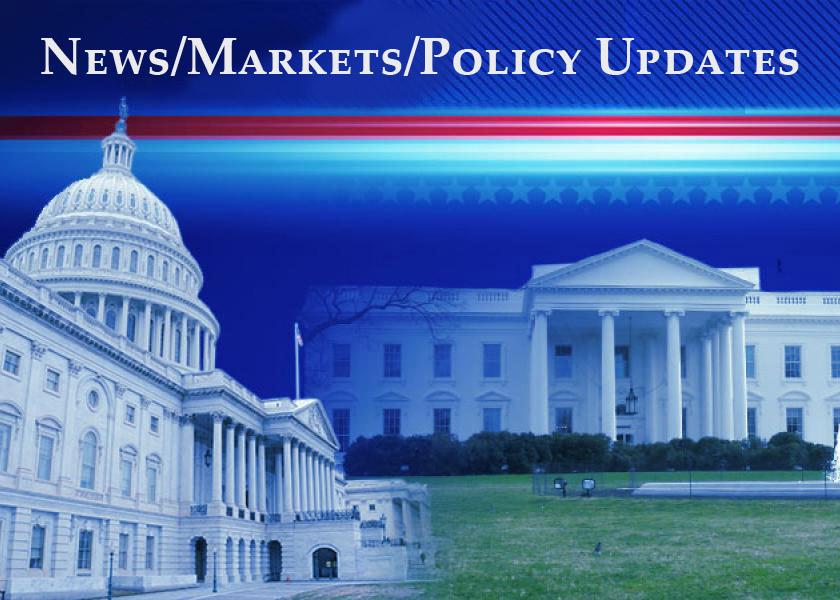New U.K. Finance Minister Advances Policy Announcements; Pound Rallies

Georgia Senate race tightens as voters list inflation as top issue | Drones hammer Kyiv
|
In Today’s Digital Newspaper |
A modified report this morning as I am in San Antonio to attend and participate at the record-attendance CIPA meeting.
Chinese leader Xi Jinping in a Sunday speech, opening a Communist Party Congress, claimed significant successes in fighting Covid-19, enforcing order in Hong Kong and curtailing what he called separatist activism in the island democracy of Taiwan, which Beijing claims as its territory. He reiterated that Beijing won’t renounce the use of force in unifying Taiwan. “The complete unification of the motherland must be realized, and it will be realized,“ he said, drawing loud applause.
Bottom line: The speech did little to quell concerns about an adversarial relationship between China and the West.
China is facing a debt crisis with $8 trillion at risk as Xi Jinping eyes a third term. Bonds issued by local government financing vehicles are on the verge of default amid a broader property market crash. Experts think Beijing will have to step in with a bailout as officials try to prevent an already-slowing economy from deteriorating further.
Yuan losses capped by state bank actions, PBOC keeps rates unchanged. State banks in China have been swapping yuan for dollars in the forwards market and selling those dollars in the spot market, six banking sources told Reuters on Monday. Beijing is trying to stabilize financial markets during the once-in-five-year Communist Party Congress that got underway Sunday. A former People’s Bank of China (PBOC) official said the country’s central bank still has many policy tools to guide yuan expectations and the currency is unlikely to have persistent sharp depreciation. PBOC fully rolled over maturing medium-term policy loans while keeping the interest rate unchanged for a second month, reinforcing expectations that conditions will continue to stay loose to help the pandemic-hit economy.
China delays key economic data. China will delay the release of economic indicators originally scheduled for publication this week, including the country’s third-quarter gross domestic product due on Tuesday, according to an updated calendar on the statistics bureau’s website. The delays announced Monday followed an unexplained move by the General Administration of Customs on Friday to skip its previously scheduled release of September’s trade data.
British pound rises as new U.K. finance minister advances policy announcements to today. The pound was up around 0.8% to $1.1259, extending gains after the statement from the U.K. Treasury. Yields on 10-year gilts (bonds) fell 30 basis points to trade around 4.029%. Yields on the 5-year fell to 4.013% and 2-year gilts slipped to 3.663%. The decision follows a dramatic day in British politics on Friday, which included big fiscal U-turns from Prime Minister Liz Truss and the sacking of Finance Minister Kwasi Kwarteng.
Jeremy Hunt, the new U.K. chancellor appointed Friday, is expected to "torch" the bulk of the mini budget that his predecessor unveiled that sent markets reeling out of concerns for the U.K.'s financial situation. The Financial Times reported that officials said most of the tax measures unveiled Sept. 23 would be "torched," except for a 13 billion pound ($14.7 billion) cut to national insurance and 1.5 billion in stamp duty charges
Drone strikes hit Kyiv on Monday, in the most significant Russian attack on Ukraine’s capital since a nationwide bombardment on Oct. 10. Russia’s flurry of strikes was launched in retaliation for an explosion on a strategic bridge and in response to Ukraine’s battlefield gains in a counteroffensive. Meanwhile, Vladimir Putin, the Russian president, confirmed at a news conference on Friday that 16,000 recruits had already been deployed to combat units, some with as few as five to 10 days of training. The Ukrainian military and U.S. intelligence say Russia is using Iranian-made drones, but Iran denies supplying Russia with such weapons.
‘Significantly less’ Ukraine winter grains sown during optimal window. Less than 30% of the Ukrainian winter grain crop area for the 2023 harvest was sown at optimal times because of poor weather, the state weather forecaster said, adding that this was “significantly less” than in previous years. “For crops that will be sown in October, there is a high probability that the plants... will enter the winter in the initial stages of development, will be weakened and vulnerable to adverse winter conditions if they occur,” forecaster said.
Ukraine October grain exports nearly back to pre-war level. Ukraine exported 2.12 MMT of grain, mostly corn and wheat, during the first 17 days of this month, according to ag ministry data. That was down 50,000 MT (2.3%) from the same period last year. Since July 1, Ukraine has exported 10.8 MMT of grain, including 5.88 MMT of corn, 3.99 MMT of wheat and 896,000 MT of barley — down 5.7 MMT (34.5%) from the same period last year.
Global stock markets were mostly firmer overnight. U.S. stock indexes are pointed to higher openings. In Asia, Japan -1.2%. Hong Kong +0.15%. China +0.42%. India +0.76%. In Europe, at midday, London +0.44%. Paris +0.54%. Frankfurt +0.51%.
Bank of America tops estimates on better-than-expected bond trading, higher interest rates.
Here are some of the other big names set to report this week:
- Tuesday: Goldman Sachs (before the bell), Netflix and United Airlines (after the bell)
- Wednesday: Procter & Gamble (before the bell), Tesla (after the bell)
- Thursday: American Airlines (before the bell), Snap (after the bell)
Wheat firmer, beans weaker and corn mixed. Wheat futures traded higher to open the week amid global supply concerns, while soybeans softened, and corn was caught in the middle. As of 7:30 a.m. ET, corn futures were trading steady to a penny lower, soybeans were 1 to 3 cents lower and wheat futures were 11 to 13 cents higher. Front-month crude oil futures were near unchanged and the U.S. dollar index was around 400 points lower.
The U.S. is forecast to enter a recession in the coming 12 months as the Federal Reserve battles to bring down persistently high inflation, the economy contracts and employers cut jobs in response, according to the Wall Street Journal’s latest survey of economists. On average, economists put the probability of a recession in the next 12 months at 63%, up from 49% in July’s survey. It is the first time the survey pegged the probability above 50% since July 2020, in the wake of the last short but sharp recession. Link for more.
Economists' forecasts for 2023 are increasingly gloomy. They now expect gross domestic product to contract in the first two quarters of the year, a downgrade from the last quarterly survey, when they penciled in mild growth. On average, the economists now predict GDP will contract at a 0.2% annual rate in the first quarter of 2023 and shrink 0.1% in the second quarter. In July’s survey, they expected a 0.8% growth rate in the first quarter and 1% growth in the second.
U.S. inflation overstated? Wharton professor Jeremy Siegel said the housing market is distorting high inflation readings. Because housing data is lagging, he expects home prices to fall up to 15%.
Biden brushes off risks of strong dollar on global economy. President Joe Biden dismissed the risks of a strong US dollar and instead blamed anemic growth and policy missteps in other parts of the world for dragging down the global economy. “I’m not concerned about the strength of the dollar, I’m concerned about the rest of the world,” Biden told reporters on Saturday during a campaign stop in Portland, Ore. “Our economy is strong as hell.”
The U.S. Treasury Department expects to release additional requests for comment on energy provisions in the new tax-and-climate law in the next few weeks, a department official said Saturday at a conference in Dallas hosted by the American Bar Association’s Tax Section. The department last week released six notices for comment, including on consumer vehicle credits.
Powell opens probe over Fed trading violations. Federal Reserve Bank of Atlanta President Raphael Bostic said his asset managers made trades that broke central bank rules, leading Chair Jerome Powell to open a probe in the latest chapter of an broader Fed ethics scandal. Bostic said in a statement Friday that he was not aware of the specific trades or timing of the transactions, which were made by a third-party manager in accounts where he did not have ability to direct trades. He detailed the transactions in corrected disclosure forms posted to the Atlanta Fed’s website.
USTR Tai confident EU issues on U.S. EV tax credits can be resolved. U.S. Trade Representative Katherine Tai told reporters that she has "every confidence that this si something we can work through with the EU right now in this period of time," referring to EU concerns over electric vehicle (EV) tax credits in the Inflation Reduction Act (IRA). EU Trade Commissioner Valdis Dombrovskis discussed the issue with Tai and U.S. Commerce Secretary Gina Raimondo last week. At issue are IRA provisions that state EVs must be produced in the U.S., Mexico or Canada to qualify for the tax credits. Some question whether the administration can come up with a way to avoid the issue from boiling over, as South Korea and Japan have also expressed concerns about the tax credit language.
Water levels on the Mississippi are approaching their lowest levels in 30 years, creating traffic jams, jacking up shipping prices, and threatening jobs that depend on this critical trade route. There’s been no rain. Vicksburg, Mississippi, which is located on the river, has received less than one inch of rain since Sep. 1. Last Friday, more than 2,000 barges were backed up along the Mississippi because certain points were closed. The river’s basin accounts for 92% of U.S. agricultural exports, and 78% of global exports of soybeans and feed grains. When the river was closed at least three times during the drought of 2012, the U.S. economy suffered $35 billion in losses.
When was the last refinery built in the United States? As of January 1, 2022, there were 130 operable petroleum refineries in the United States. The newest refinery in the United States is the Texas International Terminals 45,000 b/cd refinery in Channelview, Texas, which was operable on January 1, 2022, but actually started operating in February 2022. However, the newest refinery with significant downstream unit capacity is Marathon's facility in Garyville, Louisiana. That facility came online in 1977 with an initial atmospheric distillation unit capacity of 200,000 b/cd, and as of January 1, 2022, it had a capacity of 585,000 b/cd. Capacity has also been added to existing refineries through upgrades or new construction. Some recent examples of large increases include:
- In 2012, Motiva upgraded its refinery in Port Arthur, Texas, making it the largest U.S. refinery, with a capacity of 626,000 b/cd as of January 1, 2022.
- In 2015, Valero expanded its Corpus Christi, Texas refinery after previous expansions, bringing its capacity as of January 1, 2022, to 290,000 b/cd.
A recent Quinnipiac poll showed Georgians ranking inflation as their top issue, with a 29-point lead over the second-place issue, abortion. Twelve percent of Democrats ranked inflation as their top issue versus 73% of Republicans.
Election Day 2022 is 22 days away. Election Day 2024 is 750 days away.






